Here is the Green amendmentpublished at 15:14 BST 28 June 2017
Here is the Green amendment.
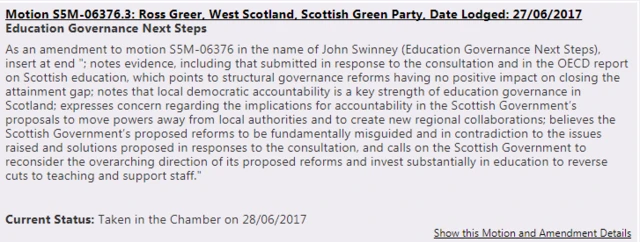 Image source, Scottish Parliament
Image source, Scottish ParliamentThe Rural Economy and Connectivity Committee takes evidence on the replacement Forth Crossing from Economy Secretary Keith Brown
Rural Economy Secretary Fergus Ewing gives evidence, after the government again asked for an extension to the deadline for making EU farming payments.
Communities, social security and equalities ministers are in the hot seats during portfolio questions
The Scottish government leads a debate on the next steps for education governance
Labour MSP James Kelly leads a debate entitled 'Charter of Rights for People with Dementia and Carers'
Colin Bell and Craig Hutchison
Here is the Green amendment.
 Image source, Scottish Parliament
Image source, Scottish Parliament Image source, bbc
Image source, bbcMr Gray says recruiting teachers and headteachers is already a problem.
He says strike action is planned already before the new changes.
The Labour MSP says the new structures look like control and centralised command with an overarching education council responsible for delivering regional plans.
This will be driven by a beefed up Education Scotland that should be reformed, he says.
Mr Gray says it looks like the education secretary wants to run schools from his office in St Andrews House.
He says take a lesson from the first minister and have another policy reset.
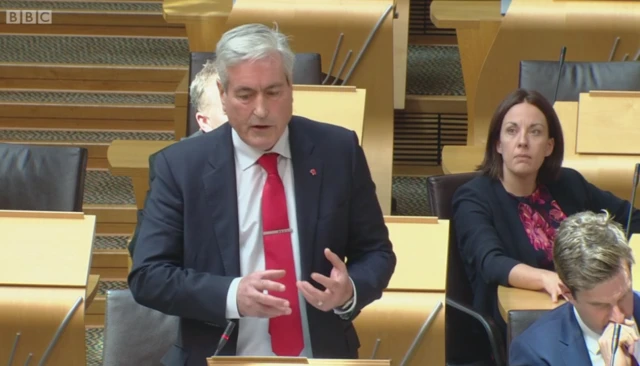
Mr Gray says the education secretary has rushed to the defence of his plans and has said that he will listen every step of the way.
"I almost choked on my cornflakes," he says, asking if Mr Swinney was "taking the mickey".
Mr Gray says there is consistent and strong opposition to Mr Swinney's plans and that the change needed is more resource and less bureaucracy.
Mr Swinney intervenes to say when he laid out his proposals Mr Gray welcomes the regional collaboration plans and asks if this is no longer the case.
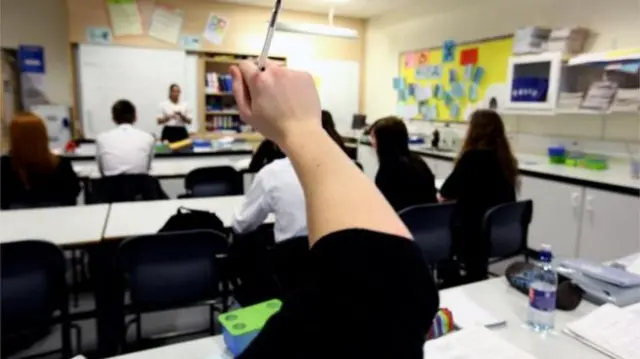 Image source, Getty Images
Image source, Getty ImagesScotland was slightly ahead of England in reading and maths and a little behind in science when the tests were last done in 2013
We reported in December that Scotland's schools recorded their worst ever performance in an international survey of pupils.
Scotland's scores for maths, reading and science all declined in the latest set of Programme for International Student Assessment (Pisa) figures.
It was the first time since the tests began in 2000 that all three subject areas were classed as "average", with none "above average".
Education Secretary John Swinney said the results made uncomfortable reading.
He said they showed that "radical reform" was needed if Scotland's education system was to become world-class again.
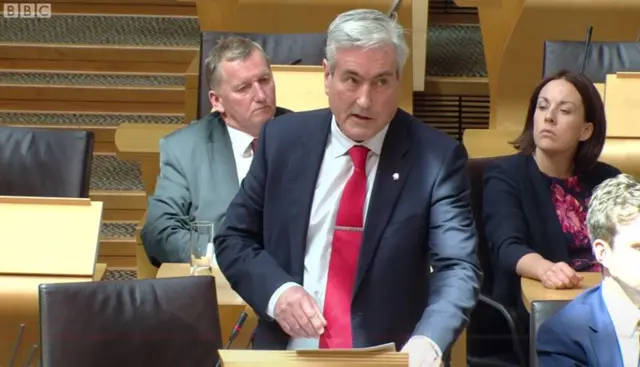 Image source, bbc
Image source, bbcLabour MSP Iain Gray
Labour MSP Iain Gray says Mr Swinney has made plain the status quo is not an option and he is right as there are 4,000 fewer teachers.
They are also about to ballot for industrial action, he says.
Mr Gray says some of the reforms in the document are welcome.
The Labour MSP says the idea of home link workers is a good one but he says he hopes there is enough of them.
He says the structural reorganisation of how schools are run has been characterised by Cosla as a 'power grab'.
Here is the Labour amendment.
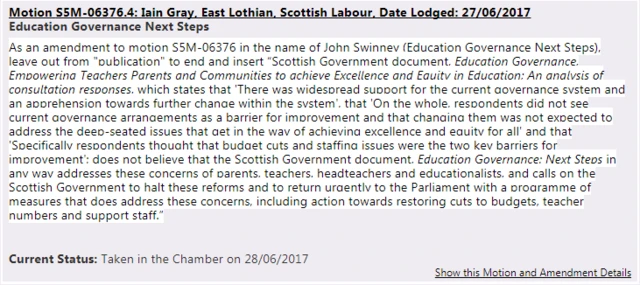 Image source, Scottish Parliament
Image source, Scottish ParliamentMs Smith raises the issue of regional collaboration.
The Tory MSP says there will be some area of bureaucratic input from regional boards.
She says it is the job of Education Scotland to provide that support and it has been found to be wanting.
The Tory MSPs says she was astonished the inspectorate will be allowed to remain part of the body that sets the curriculum.
She says the system is holding back Scottish Schools.
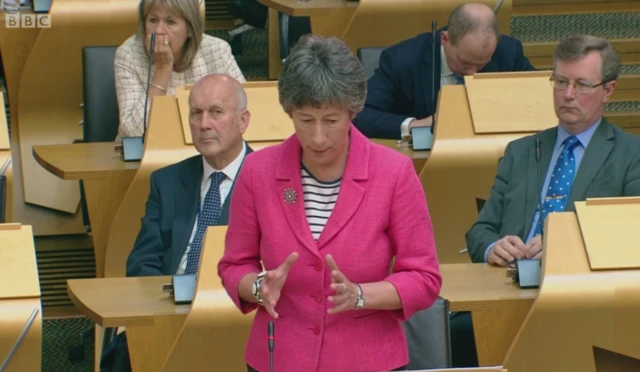
Mr Swinney says his policy intention is clear that yes there is guidance available but that headteachers can take decisions directly related to schools.
Ms Smith says the policy is clear but she is not convinced by the delivery.
The Tory MSP says the irony is that the education secretary is turning a blind eye to what actually works.
She says what drives her party is what works and the they completely reject the assertion that the failings in schools are only down to funding.
Schools' £120m funding to boost attainment
The Scottish government revealed in February, that most of the country's schools will be handed money from the attainment fund,
Ministers are giving head teachers across the country direct access to the £120m.
The money is being divided according to how many children in primary classes and the first three years of secondary school are entitled to free meals.
The list reveals that 2,513 primary, secondary and special schools will benefit from the new scheme.
The money is in addition to the funding schools receive from their local council.
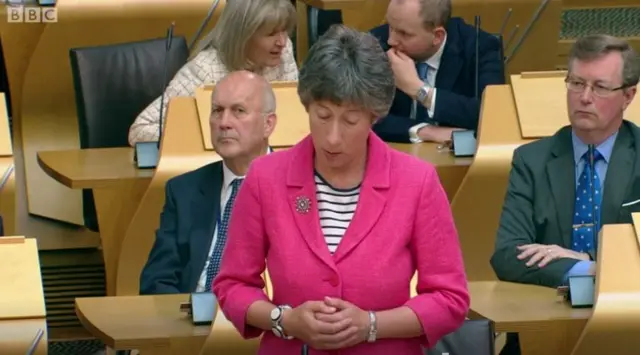 Image source, bbc
Image source, bbcTory MSP Liz Smith
Tory MSP Liz Smith says there are real issues where the power of the initial decision making behind the Pupil Equity Fund is.
Ms Smith says there should not be one size fits all approach, rather headmasters must be allowed to make decisions.
She calls for a system that delivers excellence because it inspires teachers, parents and pupils.
The Tory MSP says it looks like schools will have more freedom in how to make suggestions on how to spend the Pupil Equity Fund but not in the final decision.
Mr Swinney says there is guidance available on how to deploy Pupil Equity Funding but the whole purpose is to allow schools to make the decision themselves.
 Image source, Getty Images
Image source, Getty ImagesS2 pupils were more likely to read using an electronic device than a book
The literacy skills of Scottish school pupils have fallen over the past four years, according to figures published by the Scottish government, external.
The Scottish Survey of Literacy and Numeracy found that less than half of Scotland's 13 and 14-year-olds are now performing well in writing.
P4 and P7 pupils also saw a drop in writing performance.
The reading ability of P4, P7 and S2 pupils remains broadly similar to 2014 - but lower than 2012.
And there has been no reduction in the big gap between the performance of the country's wealthiest and most deprived pupils.
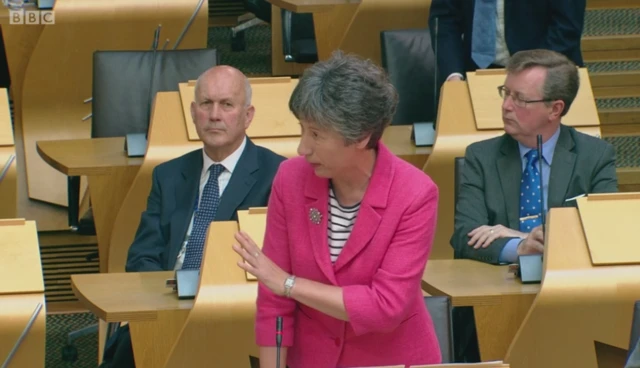
Tory MSP Liz Smith says her party will support Mr Swinney's motion but that the reforms do not go far enough which is why she moves her amendment.
The Tory MSP says the persistent problems in numeracy and literacy, too few teachers and the Curriculum for Excellence are the three main areas of concern.
Ms Smith says "this is an opportunity to change where the real power lies."
Here is the Tory amendment.
 Image source, Scottish Parliament
Image source, Scottish Parliament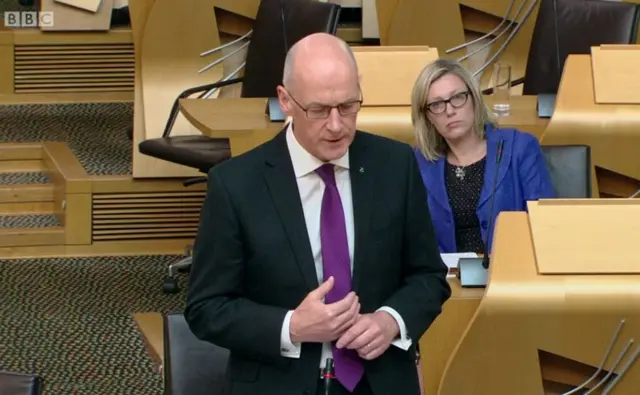 Image source, bbc
Image source, bbcMr Swinney says these measures with the Pupil Equity Fund will help address the poverty related attainment gap.
Green MSP Ross Greer says funding cuts are the barrier to collaboration and asks the government to respond to that.
Mr Swinney says he is putting the system in place that will encourage collaboration.
The education secretary says "the consistency and quality in education support must improve."
He says this is an opportunity for councils to work with partners and schools across the country.
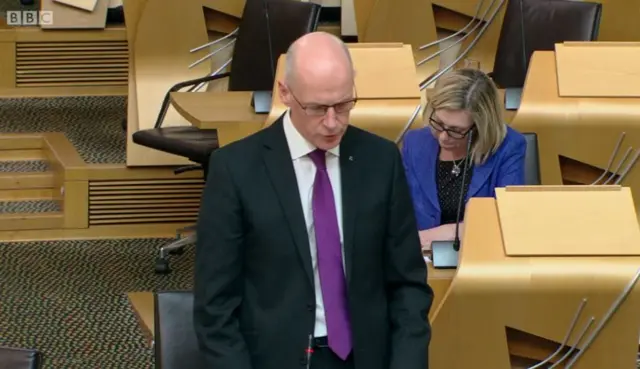
Mr Swinney says teams of professionals with different skills in different areas will work around the needs of schools.
The education secretary says specialists can give advice on closing the attainment gap in literacy and numeracy.
He says the Lib Dem amendment opposes top down regional collaboration and he says he agrees with those sentiments and says schools will set the agenda.
The education secretary says: "There will be no shift of control to Scottish ministers."
Labour MSP Alex Rowley intervenes to say teachers in his constituency talk about cuts and workload.
Mr Rowley asks how his reforms will address "chronic funding" issues in education.
Mr Swinney says Pupil Equity Funding will put more funding into many schools and he is taking efforts to address the issue of workload and says there is still work to be done.
 Image source, bbc
Image source, bbcA central aim of the reforms is to improve the attainment gap
Cosla, an umbrella group representing local authorities, said the government had "endeavoured to pull off a conjuring trick by pretending councils still have a role in the delivery of education".
A spokesman said: "We will embrace change which promotes better outcomes, but we will resist any change which does not.
"We are clear that what has been announced today erodes local democratic accountability and most certainly will not close the attainment gap."
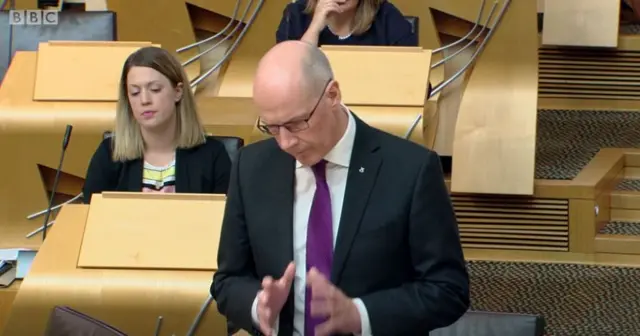 Image source, bbc
Image source, bbcMr Swinney says international evidence shows involving parents and families improves attainment.
The education secretary says parent involvement will be enhanced.
He says steps will be taken to provide a home to school worker at every school to make links between schools and families.
Pupil participation will also be strengthened he says.
Mr Swinney says teachers must be strongly supported throughout their careers.
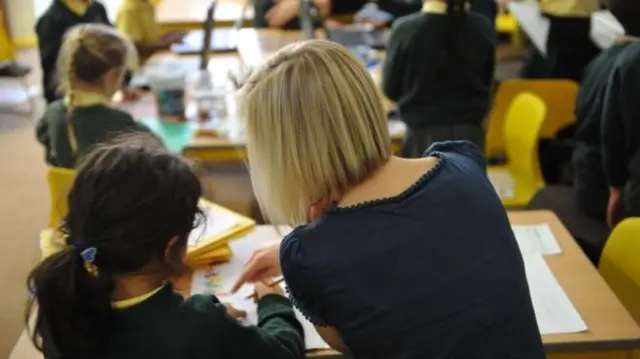 Image source, THinkstock
Image source, THinkstockTeachers ' pay is failing to keep pace with comparable professions warns the statement
The largest teachers' union, the EIS, said in its response to the government's review that the main challenges facing schools were related to funding, resources and staffing.
General secretary Larry Flanagan said: "While it is early in the process, this Review provides an opportunity for a more constructive and consensual approach to education to be re-established which would be a positive step for schools, teachers and pupils.
"It is by schools, local authorities and politicians of all parties, at local and national level, working constructively together, that we can deliver enhancements to our comprehensive education system to ensure it continues to meet the needs of Scotland's young people long into the future."